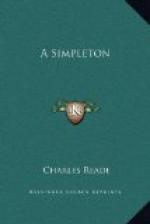“Of course I will,” said Rosa warmly. “I’ll sit for it here, any day you like.”
Now, Rosa said this, out of her ever ready kindness, not to wound Phoebe: but having made the promise, she kept clear of the place for some days, hoping Phoebe would forget all about it. Meantime she sent her husband to buy.
In about a fortnight she called again, primed with evasions if she should be asked to sit; but nothing of the kind was proposed. Phoebe was dealing when she went in. The customers disposed of, she said to Mrs. Staines, “Oh, ma’am, I am glad you are come. I have something I should like to show you.” She took her into the parlor, and made her sit down: then she opened a drawer, and took out a very small substance that looked like a tear of ground glass, and put it on the table before her. “There, ma’am,” said she, “that is all he has had for painting a friend’s picture.”
“Oh! what a shame.”
“His friend was going abroad—to Natal; to his uncle that farms out there, and does very well; it is a first-rate part, if you take out a little stock with you, and some money; so my one gave him credit, and when the letter came with that postmark, he counted on a five-pound note; but the letter only said he had got no money yet, but sent him something as a keepsake: and there was this little stone. Poor fellow! he flung it down in a passion; he was so disappointed.”
Phoebe’s great gray eyes filled; and Rosa gave a little coo of sympathy that was very womanly and lovable.
Phoebe leaned her cheek on her hand, and said thoughtfully, “I picked it up, and brought it away; for, after all—don’t you think, ma’am, it is very strange that a friend should send it all that way, if it was worth nothing at all?”
“It is impossible. He could not be so heartless.”
“And do you know, ma’am, when I take it up in my fingers, it doesn’t feel like a thing that was worth nothing.”
“No more it does: it makes my fingers tremble. May I take it home, and show it my husband? he is a great physician and knows everything.”
“I am sure I should be obliged to you, ma’am.”
Rosa drove home, on purpose to show it to Christopher. She ran into his study: “Oh, Christopher, please look at that. You know that good creature we have our flour and milk and things of. She is engaged, and he is a painter. Oh, such daubs! He painted a friend, and the friend sent that home all the way from Natal, and he dashed it down, and she picked it up, and what is it? ground glass, or a pebble, or what?”
“Humph!—by its shape, and the great—brilliancy—and refraction of light, on this angle, where the stone has got polished by rubbing against other stones, in the course of ages, I’m inclined to think it is—a diamond.”
“A diamond!” shrieked Rosa. “No wonder my fingers trembled. Oh, can it be? Oh, you good, cold-blooded Christie!—Poor things!—Come along, Diamond! Oh you beauty! Oh you duck!”




